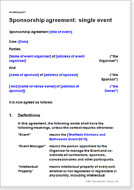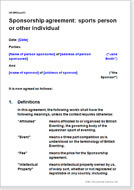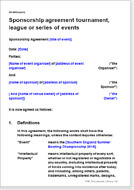Sponsorship agreements
Sponsorship deals vary hugely in complexity. Whether the sponsor is just providing financing in return for straightforward advertising, or whether the deal involves an exchange of expertise, finance, and products in return for specific promotions and media rights, we should have an agreement that suits the deal.
These agreements are suitable for sponsoring an individual, or events such as an exhibition, show or sports tournament.
Sponsorship agreement: single event
This agreement sets out the commercial deal between an event organiser and a sponsor.
It can be used for a diverse range of one-off or periodic events, from a single sports competition, where the sponsor receives advertising rights and a corporate hospitality suite in return for financial support, to a home improvements exhibition, where the sponsor receives additional or alternative rights such as the right to sell products from a stand or the right to advertise being a sponsor of the event on marketing material.
It is suitable for either party to edit and present to the other.
Example events for which this agreement could be used include:
- a sporting event, such as a demonstration, or a single competition or match
- a show, such as a musical production, or a theatre or stage production
- a fair or an exhibition
Sponsorship agreement: sports person or other individual
This sponsorship agreement provides a flexible framework for defining a sponsorship arrangement with an individual.
The arrangement could be as simple as payment for advertising on clothing, or be a more complex one such as where the sponsored individual acts as a brand ambassador at public events or in marketing materials, or tests products, or produces content for the sponsor’s marketing.
The sponsor might offer money or goods or services (their own or those of another company) to the person sponsored.
The sponsored person could be at any level of professionalism, from an individual working as an amateur to a professional at international level.
The agreement is governed by the laws of England and Wales, but the location of either party could be elsewhere. The document could, for example, be used by a British company to sponsor a Russian musician.
The agreement also includes further legal paragraphs not usually included in such agreements that protect both sides in case of later disagreement or non-fulfilment. These can also be edited to your requirements.
Sponsorship agreement: tournament, league or series of events
This is an agreement for the sponsorship of a series of events, such as each of the matches in a sports tournament, or a number of shows in a travelling theatre production.
Events in the series could be differentiated from one another by timing, content or location.
The sponsor rights granted could range from selling products from a stand to brand advertising in the venue to promotion on clothes, or in communication media.
Examples of events for which this agreement could be used include:
- multi-round or knock-out sports tournaments such as a football league, a bowls tournament, or a weightlifting championship
- a series of shows, such as a multi-day cinema festival, a travelling theatre production, or an outdoor equipment exhibition

If the document isn’t right for your circumstances for any reason, just tell us and we’ll refund you in full immediately.

We avoid legal terminology unless necessary. Plain English makes our documents easy to understand, easy to edit and more likely to be accepted.

You don’t need legal knowledge to use our documents. We explain what to edit and how in the guidance notes included at the end of the document.

Email us with questions about editing your document. Use our Lawyer Assist service if you’d like our legal team to check your document will do as you intend.

Our documents comply with the latest relevant law. Our lawyers regularly review how new law affects each document in our library.
What is a sponsorship agreement?
Sponsorship allows businesses to pay to participate in events or access particular audiences such as potential customers. Association with the theme of an event or the success of a person in their field reflects back on the sponsor.
A sponsored person may be an influencer within their sport, activity or field, and endorsement of the business' products or services can help to raise brand awareness, create loyalty to a brand, and find new customers.
Sponsorship agreements are between two parties: the sponsor who provides the funding, products or services; and the rights holder who provides the sponsorship benefit in return.
A sponsorship contract sets out the rights and obligations of each of them as well as practical matters. They provide a management framework for your sponsorship deal.
What should a sponsorship agreement include?
There is no specific applicable laws regulating sponsorship, so the majority of the content of our documents is commercial and practical rather than legal.
For example, both agreements relating to the sponsorship of events cover:
The sponsorship obligation
- the sponsorship fee
- payment schedule or delivery schedule
The right holder's obligations (as applicable)
- sponsor's rights of access to the venue beforehand for the sponsor to set-up
- dedicated parking on the day for the sponsor's guests
- provision of corporate hospitality areas
- advertising and promotion across different media, including television and radio
- product placement around the event venue
- use of intellectual property by the sponsor in marketing
- preferential event access
- right to renew
Similarly, the contract for sponsorship of a person largely covers what each party will provide to the other.
A noncompete clause or exclusivity clause could be included to ensure that the rights holder will not enter into any other sponsor agreement with a similar business or organisation or share benefits that the sponsor alone wants. However, enforcing these types of clauses is difficult. What is competitive can be subjective and only decided by a court, and even if the rights holder is in the wrong, obtaining damages might not be possible.
Instead, we suggest that the sponsor checks whether other agreements are already in place and if so, whether those prohibit what the sponsor wants to achieve. Maintaining a good, responsive relationship that meets each others' needs is usually far better than relying on possible legal retort if other sponsors are seeming to benefit in direct competition.
Using the documents
The documents provide a multitude of examples (easy to delete or change) that we hope provide ideas and opportunities you may not have considered.
The agreements could be used either by the sponsor, or by the event organiser or person being sponsored. Although the templates are fair to both parties, they can be edited to favour one over the other.
An associated area of marketing is merchandising, when intellectual property rights in a product are licensed or sold for exploitation in a different market. An example might be the right to use a sports person’s name on a food product in a certain country. We offer a number of merchandising agreement templates.
The only thing to note is that the correspondence from Net Lawman would go in to my junk rather than inbox, so I didn't get the initial response/review within 72 hours.
Although I had to make certain changes, the downloaded document proved be a very good basis for constructing the required heads of agreement.
All rights reserved



